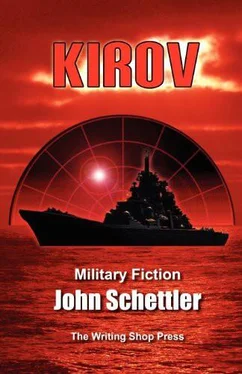John Schettler - Kirov
Здесь есть возможность читать онлайн «John Schettler - Kirov» весь текст электронной книги совершенно бесплатно (целиком полную версию без сокращений). В некоторых случаях можно слушать аудио, скачать через торрент в формате fb2 и присутствует краткое содержание. Жанр: Фантастика и фэнтези, Альтернативная история, на английском языке. Описание произведения, (предисловие) а так же отзывы посетителей доступны на портале библиотеки ЛибКат.
- Название:Kirov
- Автор:
- Жанр:
- Год:неизвестен
- ISBN:нет данных
- Рейтинг книги:5 / 5. Голосов: 1
-
Избранное:Добавить в избранное
- Отзывы:
-
Ваша оценка:
- 100
- 1
- 2
- 3
- 4
- 5
Kirov: краткое содержание, описание и аннотация
Предлагаем к чтению аннотацию, описание, краткое содержание или предисловие (зависит от того, что написал сам автор книги «Kirov»). Если вы не нашли необходимую информацию о книге — напишите в комментариях, мы постараемся отыскать её.
Kirov — читать онлайн бесплатно полную книгу (весь текст) целиком
Ниже представлен текст книги, разбитый по страницам. Система сохранения места последней прочитанной страницы, позволяет с удобством читать онлайн бесплатно книгу «Kirov», без необходимости каждый раз заново искать на чём Вы остановились. Поставьте закладку, и сможете в любой момент перейти на страницу, на которой закончили чтение.
Интервал:
Закладка:
Yet Admiral Volsky could see that this was clearly unnecessary. An EMP burst would have had far more grievous effects upon ship systems, and he could see his primary command and control facilities were still softly aglow in the dim emergency lighting of the bridge. The ship seemed to have full power, was maneuvering smartly, and was responding to commands in terms of its sensitive electrical nervous system. He could only assume that this had not been an EMP burst, which would have knocked down a good number of ship systems, potentially frying circuitry in all but the most hardened and well protected equipment.
“Belay that order,” he corrected the Captain. “I see no evidence of damage due to electromagnetic pulse. Signal resume standard action stations,” he said to Chief Orlov, and the surly chief nodded, snapping a quick hand gesture at the signalman who immediately sounded the all clear.
The Admiral glanced sharply at his Captain, then stepped up and into his chair and settled into the still warm seat, assuming full command. Karpov gave him an embarrassed look, a flash of anger hidden in his eyes, but said nothing.
“Tasarov?” The Admiral swiveled his chair to face his ASW Chief, Alexi Tasarov. The Captain was hovering near that station, tense and alert.
“The same, sir. No acoustic or sonic contact on passive systems. Intense noise on all passive sensors. And we just churned up the seas pretty badly with this maneuver. There’s a great deal of interference. I can’t read a thing under these conditions.”
“What about the Orel?”
Tasarov hesitated briefly, looking at his screens and adjusting his headset. “No, sir. I have no fix on her position. Her Target Motion Analysis track is void now.”
“An enemy submarine,” said Karpov. “This is how they work, Admiral. The bastards slink up on you in the dark. Tasarov, are you sure you hear nothing?”
“Not with this interference and the screw noise, Captain.”
The Admiral could see that Karpov was very agitated. He was already convinced this was a deliberate attack, and a stealthy NATO submarine was plying the waters of his mind, even if Tasarov could not hear it. He turn to his ASW man again. “Do you recommend anti-submarine procedures based on this information. Mister Tasarov?”
“I cannot report or confirm any hostile contact on passive sonar, Admiral. But the Captain may have a point, sir. That was a very strange emission after the explosion. I can’t be certain my systems are functioning properly until we do a full diagnostic. Under the circumstances, we may have been targeted by a nuclear armed torpedo, yet I heard nothing in the water, sir.”
Volsky’s eyes narrowed suspiciously, his brow set, lips pursed with some inner conclusion. “Prepare to go to active sonar,” he said quietly. And then to his communications officer he said: “Contact Orel at once.”
“But Admiral,” Karpov said again. “That will reveal our position! If this was a nuclear armed torpedo attack-”
“Then we would not be discussing it,” the Admiral countered. “Reveal our position? You think NATO will have overlooked us cruising about these last three days? They’ve had surveillance planes over us every day now. And if they did attack us, are their targeting systems all suddenly faulty? Bring the ship back on our original heading. Steer 225 degrees southwest,” he said to his helmsman now, clearly annoyed. Karpov may have been a good businessman, he thought, but he has certainly misjudged this situation. Volsky did not think this was a torpedo attack, nuclear or otherwise, but active sonar might help him find Rudnikov’s submarine.
“ Orel does not respond to hails, sir.”
“Active sonar,” said the admiral. “Reacquire Orel at once.”
“Aye, sir.” The pinging pulse of the sonar punctuated the tense silence on the bridge as Admiral Volsky waited. Three pings, four, seven… The time seemed to stretch interminably, yet Tasarov remained silent, hunched over his station with intense concentration, listening with his eyes closed for a time, then blinking as he peered at his phosphorescent view screens. Karpov seemed to be listening with him, his eyes moving furtively from the ASW sonar screens to the forward view panes, and there was fear there, Volsky noted. He had seen this before in his new Captain. Karpov hated submarines, and when they drilled in ASW warfare tactics he always seemed particularly taut and on edge.
There was no contact anywhere on Tasarov’s scope, and nothing was discernable in the chaotic data stream he was monitoring now. The ocean around them played like the devil’s symphony, a muddle of odd noise and disorganized signal patterns, at least insofar as his equipment was concerned. Yet he knew his information was no more reliable now than the systems that provided it. Clearly there had been some kind of undersea explosion, and the damage may not yet be fully evident if the ship’s systems were affected. Orel had been cruising off their starboard bow, at roughly 20,000 yards and close enough for him to detect her on either his passive or active systems. Yet she was gone.
“I have no reliable readings, sir,” said Tarasov.
“I concur, Admiral,” said Rodenko. The radar man had a perplexed look on his face. “There’s nothing within thirty nautical miles of us. Nothing on any of my systems at all.”
“You have no reading on the Slava?” The Admiral was referring to the old cruiser that had been towing their targeting barges some thirty nautical miles south of their position.
“I have no acquisitions whatsoever, sir. This is crazy, I can't even read the weather front that I was monitoring any longer! It was moving south at nearly thirty kilometers per hour, but there is nothing on my screen now. We must have sustained significant damage. I will switch to phased array and continue the search.”
Volsky’s eye was immediately drawn to the barometer, where he saw, to his great surprise, that the pressure had elevated considerably. He frowned, his thick features registering disbelief. And yet, the tooth that had been bothering him had quieted down, and he could feel the difference in the environment around him. The weather had changed, and decidedly so.
His gaze was drawn to the forward view pane where he noted the seas, which had once been swelling up with the rising wind, had also calmed. The strange luminescent glow still rippled from the depths of the water, an eerie phosphorescent green. Seeing that the digital screens had settled down, he gave an order to display the various arcs of view on the monitors.
“Pan the Tin Men,” he said calmly, his eyes fixed on the big screen to his left.
He was referring to the odd looking equipment mounted on Kirov’s two forward watch decks called the ‘Tin Men’ by the crew, because they looked much like two great metal robots standing their solitary watch. Each Tin Man mounted the HD cameras and optical sensors necessary to provide high resolution views for every arc of the ship to the flat panel monitors in the ship’s command center. Rodenko toggled switches on his console and outside the ship the steely figures slowly rotated to pan and display the sea all around the ship.
Admiral Volsky was amazed as he stared at the screen. The ocean rippled with the same odd luminescence in all directions, as if Kirov herself was the source of the energy affecting the sea. The choppy swells had calmed, and there was an unnatural stillness over the scene. In the distance, he perceived what looked like a low bank of gray white fog.
“How can this be?” he said, more to himself than anyone else. He slipped off his chair walking slowly up to the forward view panes and staring at the glowing water and distant horizon ahead, his eyes unwilling to trust the images on the screen. He was looking for the obvious signs of an undersea nuclear explosion, yet it is what he did not see that disturbed him most.
Читать дальшеИнтервал:
Закладка:
Похожие книги на «Kirov»
Представляем Вашему вниманию похожие книги на «Kirov» списком для выбора. Мы отобрали схожую по названию и смыслу литературу в надежде предоставить читателям больше вариантов отыскать новые, интересные, ещё непрочитанные произведения.
Обсуждение, отзывы о книге «Kirov» и просто собственные мнения читателей. Оставьте ваши комментарии, напишите, что Вы думаете о произведении, его смысле или главных героях. Укажите что конкретно понравилось, а что нет, и почему Вы так считаете.












